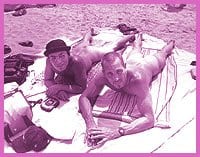For JP Hornick, the legal saga that started with bright pink summons taped to her co-op mailbox in October 2000 ended last week with a gasp of joy, as a judge dismissed the liquor licence charges against her.
“I feel incredible relief and closure now. It’s still hitting me,” says Hornick, who along with fellow women’s bathhouse organizer Rachel Aitcheson, was at the centre of the controversial case over sexual freedom and the Toronto Police Service decision to send male offers to a women-only sex event.
The two women were charged with six liquor infractions each; if found guilty, they could have faced fines of tens of thousands of dollars and jail time.
Instead, in a small court room tightly packed with anxious supporters, Ontario Court Judge Peter Hryn last Thursday agreed with almost every point of their argument – that the five male police investigating their September 2000 women’s bathhouse violated their constitutional rights. He threw all the evidence out and the Crown withdrew all the charges.
In a remarkable ruling, he said the women were entitled to a safe place to explore their sexuality, free from the precence of men.
As Hryn read his lengthy decision, filled to bursting with criticisms of the police – he compared the investigation to a strip search, visual rape and said it was “one of the clearest cases” where police behaviour shocked the community – Aitcheson couldn’t believe what she was hearing.
“With each point he agreed with us, it was like a weight lifting off. I didn’t expect it to be as sweeping as it was,” she says.
Aitcheson, 33, and Hornick, 31, were the two Toronto Women’s Bathhouse Committee members who put their names on the Special Occasions Permit for alcohol for the Sep 14, 2000 Pussy Palace, held at the normally men-only Club Toronto bathhouse on Mutual St. It was billed as a venue for women to explore their sexuality in a safe environment.
Police, claiming to be investigating a criminal complaint, sent two undercover female agents who stripped down to towels to check out what was going on inside. Though the female officers collected most of the Crown’s evidence against Hornick and Aitcheson, five male officers had already planned to enter the bathhouse and followed the female cops in; four of them toured all three floors, knocking on doors and chatting up patrons, while the lead investigator, Det Dave Wilson, questioned Hornick at the entrance.
“I remember these big guys and thinking: These aren’t butch lesbians,” says Hornick.
Though the male officers did not see Aitcheson and Hornick unclothed, their lawyer Frank Addario said that, as hosts of the event, their privacy rights were violated because male officers did see their naked and partly naked guests. Of the 350 women in attendance, police estimated at least 60 percent were topless – one male officer even counted them.
“I find in this case there was a reasonable expectation of privacy vis a vis men in general and male police officers,” said Hryn (who was a defence lawyer in the case against men found in several Toronto bathhouses police raided in 1981). “I find the search in this case was analogous to a strip search…. If patrons were taken to a police station, they would have been searched by other female officers.”
Aitcheson says that’s a no-brainer for everybody – but the Toronto police.
“When I initially told my mother what happened that night, her response was, ‘I wonder how many stag and doe parties they visit.’ She gets it. Everybody gets it.”
Though vindicated by the decision, the fall-out from the case isn’t over. The Women’s Bathhouse Committee filed an Ontario Human Rights Commission complaint against the police and have asked the Toronto Police Services Board for an investigation; they’ve heard nothing from either yet. They’ve asked the police for an apology, but Toronto Police Chief Julian Fantino won’t comment on the decision.
The investigating officers filed a defamation lawsuit against City Councillor Kyle Rae when he publicly compared their actions to a “panty raid.” That case is still set for a May 2002 hearing, though Rae says his lawyers will be using this decision for his defence.
There’s also cash. The women have wracked up legal costs of $60,000, and have raised only half so far. They’re still accepting donations in care of the Women’s Bathhouse Defense Fund, 175 Harbord St, M5S 1H5.
Hornick says the case and the verdict mean a lot to Toronto’s queer community.
“As someone who’s been an activist all my life, it’s just hitting me what the decision means for our community. I’ve always help out of the public eye, that was the most traumatic thing about it,” she says. “But I wouldn’t hesitate to get a Special Occasion Permit again.”
A $125 ticket fundraising dinner to cover legal expenses will be held at Byzantium (499 Church St), Tue, Mar 26. Call (416) 340-8484, ex 319 or check out Pussypalacetoronto.com for info.


 Why you can trust Xtra
Why you can trust Xtra


